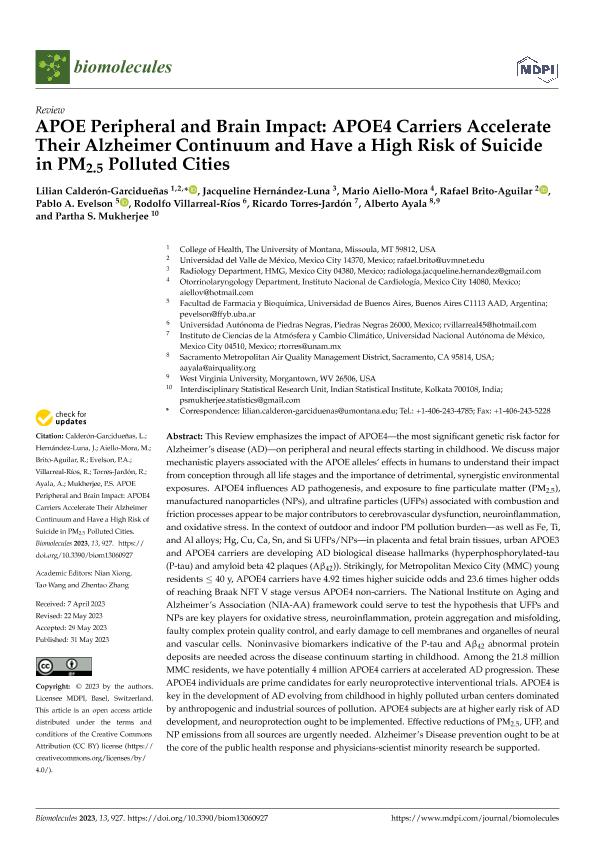Artículo
APOE Peripheral and Brain Impact: APOE4 Carriers Accelerate Their Alzheimer Continuum and Have a High Risk of Suicide in PM2.5 Polluted Cities
Calderón Garcidueñas, Lilian; Hernández Luna, Jacqueline; Aiello Mora, Mario; Brito Aguilar, Rafael; Evelson, Pablo Andrés ; Villarreal Ríos, Rodolfo; Torres Jardón, Ricardo; Ayala, Alberto; Mukherjee, Partha S.
; Villarreal Ríos, Rodolfo; Torres Jardón, Ricardo; Ayala, Alberto; Mukherjee, Partha S.
 ; Villarreal Ríos, Rodolfo; Torres Jardón, Ricardo; Ayala, Alberto; Mukherjee, Partha S.
; Villarreal Ríos, Rodolfo; Torres Jardón, Ricardo; Ayala, Alberto; Mukherjee, Partha S.
Fecha de publicación:
05/2023
Editorial:
MDPI
Revista:
Biomolecules
ISSN:
2218-273X
Idioma:
Inglés
Tipo de recurso:
Artículo publicado
Clasificación temática:
Resumen
This Review emphasizes the impact of APOE4—the most significant genetic risk factor for Alzheimer’s disease (AD)—on peripheral and neural effects starting in childhood. We discuss major mechanistic players associated with the APOE alleles’ effects in humans to understand their impact from conception through all life stages and the importance of detrimental, synergistic environmental exposures. APOE4 influences AD pathogenesis, and exposure to fine particulate matter (PM2.5), manufactured nanoparticles (NPs), and ultrafine particles (UFPs) associated with combustion and friction processes appear to be major contributors to cerebrovascular dysfunction, neuroinflammation, and oxidative stress. In the context of outdoor and indoor PM pollution burden—as well as Fe, Ti, and Al alloys; Hg, Cu, Ca, Sn, and Si UFPs/NPs—in placenta and fetal brain tissues, urban APOE3 and APOE4 carriers are developing AD biological disease hallmarks (hyperphosphorylated-tau (P-tau) and amyloid beta 42 plaques (Aβ42)). Strikingly, for Metropolitan Mexico City (MMC) young residents ≤ 40 y, APOE4 carriers have 4.92 times higher suicide odds and 23.6 times higher odds of reaching Braak NFT V stage versus APOE4 non-carriers. The National Institute on Aging and Alzheimer’s Association (NIA-AA) framework could serve to test the hypothesis that UFPs and NPs are key players for oxidative stress, neuroinflammation, protein aggregation and misfolding, faulty complex protein quality control, and early damage to cell membranes and organelles of neural and vascular cells. Noninvasive biomarkers indicative of the P-tau and Aβ42 abnormal protein deposits are needed across the disease continuum starting in childhood. Among the 21.8 million MMC residents, we have potentially 4 million APOE4 carriers at accelerated AD progression. These APOE4 individuals are prime candidates for early neuroprotective interventional trials. APOE4 is key in the development of AD evolving from childhood in highly polluted urban centers dominated by anthropogenic and industrial sources of pollution. APOE4 subjects are at higher early risk of AD development, and neuroprotection ought to be implemented. Effective reductions of PM2.5, UFP, and NP emissions from all sources are urgently needed. Alzheimer’s Disease prevention ought to be at the core of the public health response and physicians-scientist minority research be supported.
Archivos asociados
Licencia
Identificadores
Colecciones
Articulos(IBIMOL)
Articulos de INSTITUTO DE BIOQUIMICA Y MEDICINA MOLECULAR
Articulos de INSTITUTO DE BIOQUIMICA Y MEDICINA MOLECULAR
Citación
Calderón Garcidueñas, Lilian; Hernández Luna, Jacqueline; Aiello Mora, Mario; Brito Aguilar, Rafael; Evelson, Pablo Andrés; et al.; APOE Peripheral and Brain Impact: APOE4 Carriers Accelerate Their Alzheimer Continuum and Have a High Risk of Suicide in PM2.5 Polluted Cities; MDPI; Biomolecules; 13; 6; 5-2023; 1-30
Compartir
Altmétricas



